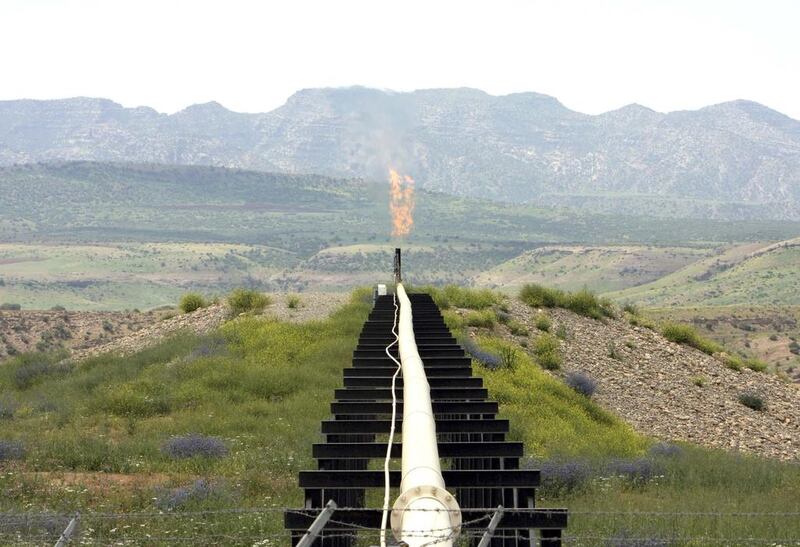The tug of war between Baghdad and Erbil has become a traditional fixture in the Iraqi political calendar in the months before the debate on the country’s budget, with both sides claiming that the other is failing to fulfil its constitutional commitments.
This year is no different, with Baghdad upping the Kurdistan Regional Government's (KRG) oil export quota to an unfeasible 400,000 barrels per day, up from 250,000 bpd last year. Baghdad has threatened to cut the Kurds out of the budget if they do not hit that target on which, it claims, the annual budget relies.
The KRG, meanwhile, claims that it is not receiving the 17 per cent of Iraqi revenues to which it is entitled under the constitution to, among other commitments, pay salaries of the peshmerga (armed forces).
Most recently, the Kurds have begun to export oil to Turkey through a new pipeline independently in direct defiance of Baghdad, which has angrily accused the KRG of stealing Iraqi oil in the international media.
“The spat is nothing new, but the difference this time is the amount of oil that can be exported by the KRG, which could turn the table on Baghdad in terms of economic dependence. Baghdad will have little or no leverage left if the KRG can sell oil independently,” said Shwan Zulal, the head of Carduchi Consulting in London.
The KRG ministry of natural resources exported two million barrels of crude through the pipeline in January, and it has a target of 10 million to 12 million barrels a month by the end of the year. Although for the time being Turkey has vowed not to sell Kurdish oil until it receives a green light from Baghdad, Mr Zulal estimated that within 18 months the KRG could be exporting enough to sustain itself, at least in the short term.
Speaking to the local newspaper Rudaw earlier this year, the KRG deputy finance minister, Rashid Tahir, intimated that the Kurdish region of Iraq had an eye on self-sufficiency as the exports through the Turkey pipeline increase. He said the KRG made 10.5 trillion Iraqi dinars (Dh33.1 million) through oil exports and internal revenues last year.
It is little surprise, then, that Baghdad has been piling on the pressure, with Haider Al Abaidi, the head of the Iraqi parliament’s treasury committee, saying last month that unless the Kurds upped their production to 400,000 bpd and pay export revenue to the national treasury this year, the budget will collapse.
He estimated that the Iraqi budget deficit would be as much as US$18 billion this year even if the Kurds do meet this target — because of a sharp increase in public sector wages, student allowances, child benefit and pensions — and warned that the Kurdish region risked losing its cut of state spending if it did not pay Baghdad what it demands.
“They are not contributing, so why should they get something out of it? At the moment we have a deficit of 21tn dinars. If you add 15tn or 16tn dinars to it [the amount expected to be lost if the KRG does not pay its oil export revenue], the budget will collapse,” he said.
But analysts are not convinced by such guilt-tripping on the part of the south. Richard Mallinson, a geopolitical analyst and Iraq expert at Energy Aspects in London, argued that the rhetoric over budget collapse is overblown, citing the fact that similar warnings were made last year with little drastic consequence for Iraq’s finances.
“[The 2013 budget] supposed 250,000 bpd of exports going into the federal budget over the entire year. Kurdistan hasn’t done that and the budget hasn’t collapsed because oil prices have been higher and because Baghdad hasn’t spent as much as it was anticipating,” Mr Mallinson said.
“So some of these statements are more about trying to apply pressure on the Kurds.”
Mr Zulal expects the final production targets to be lowered during negotiations over the budget, given that the current expectations are so unfeasible.
“[They are] setting the target high to negotiate down later. The KRG has no capacity at this moment to export 400,000 bpd. Even if they hit that level of production, the domestic market would be starved. It would not be practical,” he said.
In terms of a resolution, it will likely be politics that forces a compromise between the north and the south. Analysts point out that the parliamentary elections in Iraq in April have intensified the political dimension of the negotiations, with the prime minister, Nouri Al Maliki, needing to look tough on the Kurds to appease nationalists in the south as he vies for a third term in office.
“Baghdad is using it to play to the nationalists and ultranationalists in Iraq. He needs to show that he is not letting the Kurds get away with it,” Mr Zulal said.
Others said that the elections, along with being partly responsible for the spat, could also help to resolve it, with Mr Maliki coming to an agreement with the Kurds in return for their support for his leadership bid. Indeed, the Kurdish parties remain a powerful bloc in the perennially divided Iraqi parliament.
“There is then the question of the coalition building in the constitutional assembly and the fact that the Kurds are an important power bloc alongside the main Shia and Sunni parties — so certainly Mr Maliki and his government haven’t been able to dismiss them completely. They have always tried by and large to work with them,” Mr Mallinson said.
“I expect that somewhere around the election, either just before or just after, Baghdad will grudgingly agree to allow the KRG to manage its own oil exports, with some sort of revenue-sharing arrangement.”
business@thenational.ae





